HONOURING ANZAC DAY TRADITIONS, Part 1

6 Wing AAFC prepare for ANZAC Day – including ‘their’ medals
Australian Air Force Cadets from South Australia and Mildura are currently preparing for their involvement in various Anzac Day commemorative activities. They are busy confirming that their Service Dress uniforms fit properly, their Hat Fur Felt brims are flat, and their medals are ready for wear.
Cadets wearing medals? Yes, this is possible in certain circumstances according to time-honoured traditions, says 6 Wing Public Affairs & Communication Officer, Pilot Officer (AAFC) Paul Rosenzweig.
CAPTION: Cadet Sergeant Casey Dibben, No 6 Wing AAFC, wears the medals of her maternal great-grandfather Private Geoffrey Whiteman, 6th Australian Division Workshops, AIF.
The AAFC Manual of Dress says that cadets may wear on their Service Dress uniform the medals of a deceased relative, passed down in a direct line from grandparents to parents. Cadets may not wear the medals of a relative who is still living.
Wing Warrant Officer for No 6 Wing, Warrant Officer (AAFC) Henry Bell, said: “Cadets participating in a Youth Vigil, Dawn Service, Anzac Day Commemorative March or similar Anzac Day activity are encouraged to honour the service of a deceased family member by wearing their medals in the appropriate manner”.
This privilege does not apply however when a cadet is participating in an official capacity, including Guards of Honour and Catafalque Parties.
During her participation in Anzac Day activities this year, Cadet Sergeant Casey Dibben will honour the service of her maternal great-grandfather Private Geoffrey Whiteman (1922-1985), who served in New Guinea with the 6th Australian Division Workshops AIF.
Geoffrey Whiteman was born in Williamstown, SA on 29 August 1922, the son of Frank and Gladys Whiteman. He first enlisted in the Citizens Military Forces (CMF) in 1941 and served with the 18th Garrison Battalion in SA. On 15 December 1941, he was called up for Full-Time Duty, serving in Darwin and north Queensland. Aged 20, he volunteered for overseas service on 22 March 1943 and embarked in Townsville the next day on the Australian Army transport MV ‘Duntroon’.
Private Whiteman disembarked at Port Moresby, New Guinea on 25 March and served there with the 6th Australian Division Workshops (Australian Electrical & Mechanical Engineers) as a member of the Second Australian Imperial Force (AIF).
In mid-1944 he embarked at Port Moresby for return to Australia, and continued serving with the South Australia Area Workshops (4th Military District). He was discharged as Medically Unfit on 28 May 1945.
For his war service in New Guinea, Private Whiteman was awarded the 1939-45 Star, Pacific Star, War Medal 1939-1945 and Australia Service Medal 1939-1945, and he received the Returned From Active Service Badge.
Participating in community ceremonial activities helps Air Force Cadets learn self-discipline and teamwork, and gives them a sense of pride and belonging.
Pilot Officer (AAFC) Paul Rosenzweig said: “Participating in these commemorative events gives cadets the opportunity to mix with veterans of overseas operational service, bridging the generations and laying a foundation of honour and respect which will follow them through their life and career”.
.
HONOURING ANZAC DAY TRADITIONS – PART 2
HONOURING ANZAC DAY TRADITIONS – PART 3
.
.
.
.
.
.
.

.
.

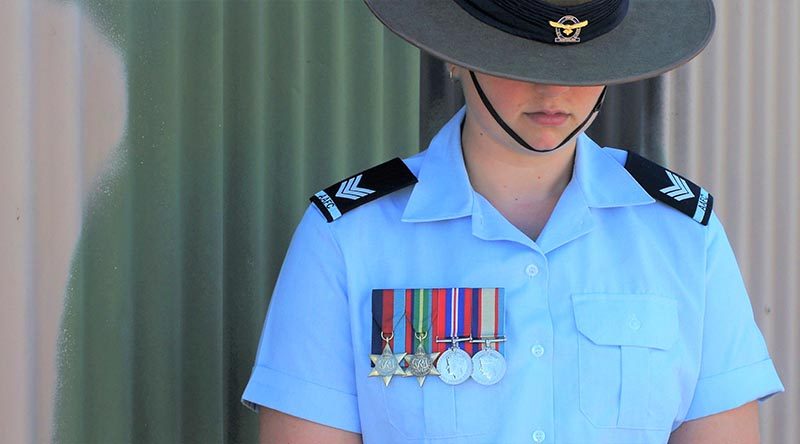


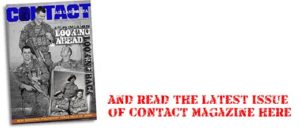
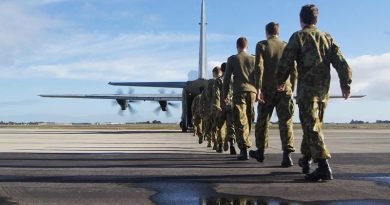
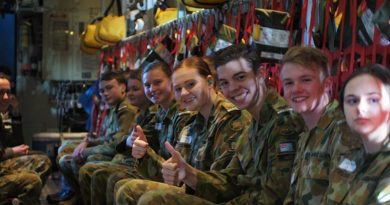
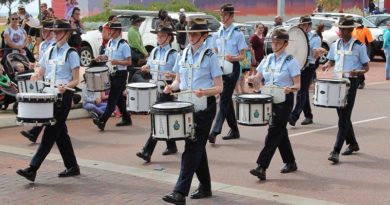
The Australian Air Force Cadets (AAFC) is a youth oriented organisation which operates in a military and aviation environment, but Cadets are not members of the Australian Defence Force. For recruitment enquiries in South Australia pls contact:
paco.6wg (at) aafc.org.au